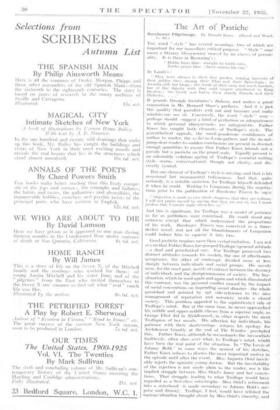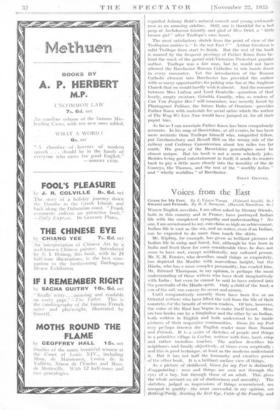The Art of Pastiche
Tun word ` style " has several meanings, two of which are important for our immediate critical purpose. " Style " may . mean a literary -idiosyncrasy caused by an excess of persons alitY. It is there in Browning's :
" Hobbs hints blue—straight: he turtle eats, • Dobbs prints blue::--elaret crowns his cup."
to 'Lamb's They were always in their first garden, reaping harvests ot
thei I! golden among their Mori 41 nd their Spieo-legia ; in Aretults still, but kings ; Abe ferule of their sway not unfelt harsher, but of like dignity with that mild sceptre attributed to King liastleus ; the Clreck and Latin, their stately Pamela, and their.
. . ."
, t pounds through Swinburne's Dolores, and makes a great commotion in Mr. Bernard Shaw's prefaces. And it is just. this quality that parodists seek out and treasure and make mischievous use of. Conversely, the word " style " may----. is.rh:11). should—suggest a kind of perfection or adequateness • to which personal idiosynerasies arc antagonistic. Father' Knox has caught both elements of Trollope's style. The' • parenthetical appeals, the mock-ponderous confidences of author to reader, the as-far-as-I-can-gathers and the do-not-; jump-dear-reader-to-sudden-conclusions are present in discreet; enough quantities to ensure that Father Knox intends not a• parody but a pastiche on the grand scale. Equally present is an admirably sedulous apeing of Trollope's essential writing: style--warm, conversational, though not chatty, and dis-: erectly cynical.
But one element of Trollope's style is missing, and that is his; occasional but monumental tediousness. And that, quite' seriously, is a notable omission; for Trollope himself defended it When he could. Writing to Longmans durhig the negotitt-', tions prior to the publication of Dorchester Towers he saySt: Objection is made to two whole chapters, that they are tedious. 1 Will not praise myself by saying that they arc net so, but I must prOfess that. I cannot make them less so."
And this is significant, for Trollope was a model of patience as 'far as publishers were concerned: lie could stand Any criticism except that which undermined the proportions of his work. Dorchester Towers was conceived as a three-i decker novel, and not all the blandishments of Longman: could induce him to squeeze it into two. • Good pastiche requires more than verbal imitation. I am not sosare that Father Knox has grasped Trollope's general attitude. —a dual and paradoxical one. For Trollope possessed two distinct attitudes towards his models, the one of affectionate acceptance,' the other of contempt, divided more or less sharply between individuals and social groups. His novels' were, for the most part, novels of contrast between the decency of individuals and the disingenuousness of society. The key-. situation, which he used again and again and which illuminated• this contrast, was the personal conflict caused by the impact of social conventions on impending secret disaster-Lthe whole garnished and pointed by apt side-reference to the nice. Management of reputation and notoriety inside - a closed society. This problem appealed to the sophisticatel side of Trollope's mind. But at the same time, he never approaChed■ his middle and, upper-middle classes from a superior angle, as George Eliot did in Middlemarrh, in other respects the ntost Trollopian of her novels. His affection for individuals, his patience with their shortcomings--witness his apology. for ArChdeacon Grantly at the end of The Warden—precluded this. Father, Knox, although he reconstructs the inessentials faultlessly, often slurs over what, to Trollopc's mind, would have been the real point of the situation. In :" The Loves of Johnny Bold," in some ways the neatest of his sketches,' Father Knox refuses to discuss•the most important motive in the episode until after 'the event. Miss Augusta Oriel inevit- ably rejects the agnostic young doctor. But the inevitability of the rejection is not made plain to the reader, nor is the implied struggle between Miss Oriel's fancy and her conics tions. That struggle, leading to what Trollope would have regarded as a first-class catastrophe—Miss Oriel's retirement into a sisterhood—is made secondary to Johnny Bold's stir-. prise and dismay. TrolloPe, 1 feel, would have relithed the curious situation brought about by MisS'Oriel's sincerity, and regarded Johnny Bold's natural conceit and young awkward- ness as an amusing sideline. Still, one is thankful for a last peep at Archdeacon Grantly and glad of Miss Oriel, a " little brown girl " after Trollope's own heart.
The most satisfactory sketch from the point of view of the Trollopian unities is " Is she not Fast ? " Arthur Gresham is solid Trollops from start to finish. But the rest of the book is marred by the frequent peerings of Father Knox from be- hind the mask of the genial mid-Victorian Protestant popular author. Trollope was a fair man, but he would not have allowed the Barchester Roman Catholics to win hands down in every encounter. Yet the introduction of the Roman Catholic element into Barchester has provided the author with so many opportunities for poking wise fun at the Anglican Church that we would hardly wish it absent. And the romance between Miss Lufton and. Lord Dunbello—grandson of that lovely, empty creature, Griselda Grantly, who, as readers of Can You Forgive Her ? will remember, was secretly loved by Plantagenet Palliser, the future Duke of Omnium—provides Father Knox with materials for social satire which the author of The Way We Live Now would-have jumped at, for all their papist bias.
As far as I can ascertain Father Knox has been scrupulously accurate. In his map of Baraetshire, at all events, he has been more accurate than, Trollope himself who, misguided fellow, put Gresharnsbury and Boxall Hill on the wrong side of the railway and Crabtree Canonicorum about ten miles too far south. His grasp of the Barsetshire genealogies must be almost unique. But his book is not a mere scholarly joke. Besides being good entertainment in itself, it sends its readers back to pry a little more closely into the heredity of the de Coureys, the Thornes, and the rest of the " worldly holies " and " wholly worldlies " of Barchester.
SALLY GRAVES.































































































 Previous page
Previous page